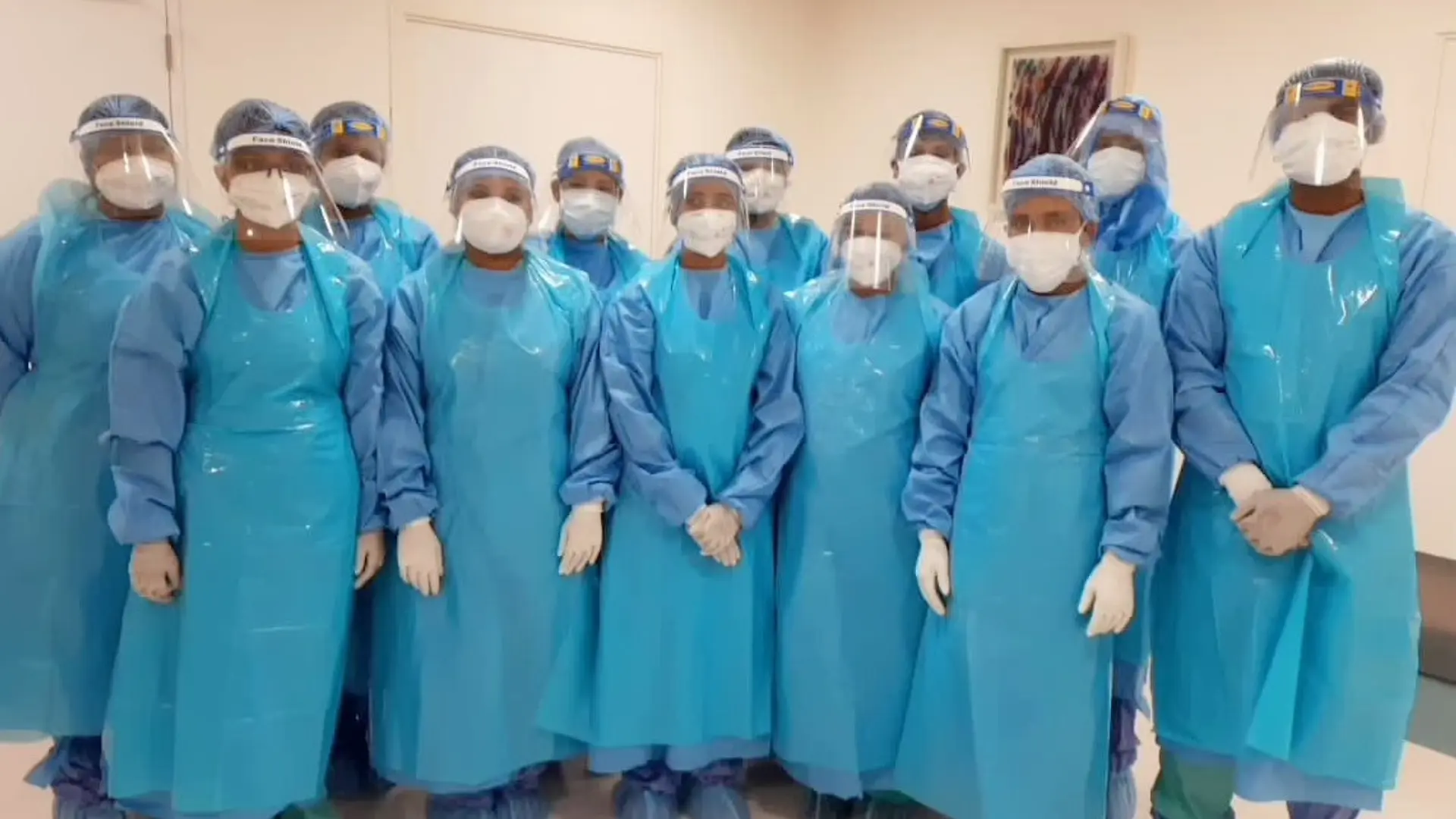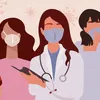We have had to think on our feet for survival, but there are small victories every day: Manisha Kumar, Hospital Head, Columbia Asia
In an interview with YourStory this week, Manisha, who has been in the healthcare industry for over a decade, spoke about what the past two months have been like at Columbia Asia Hospitals in Bengaluru.
Bengaluru has been in the grip of the second wave since late March. What started as a slow but steady rise in cases turned into an out of control situation pretty quickly, leaving hospitals and frontline workers scramming to deal with patient overflow.
So while the wave came quickly, hospitals have been left grappling. Giving us a glimpse of what life has been like is Manisha Kumar, Hospital Head and General Manager of Columbia Asia Hospitals, Bengaluru.
In a touching note, Manisha recently shared this on LinkedIn,
The last 6 weeks have been the most trying times ever! We have been pushed to the extreme; been stretched for beds, for life saving medicines, ventilators and even pressed for oxygen that we have always taken for granted. As we work tirelessly day in and day out to fight this seemingly endless battle, I see amazing resilience and commitment at the ground level! #Frontline teams that are exhausted beyond comprehension but go on to work unflinchingly every single day to save one more life. They take huge risk every day; meet with negative outcomes but never give up. And that is what is driving #healthcare in India today – not the shredded infrastructure, not the aid money coming from across the world.
Amidst this, we may miss your calls – we are inundated with them and trying to answer as many as possible; we may take some time to respond – we only have so many #doctors & nurses treating as many patients as possible; we may take some time to allocate beds – we are trying our best to expand infrastructure, optimise usage of oxygen, procure resources by all means possible.
We are working at 200% capacity and gearing up to work at even higher – So please be patient, be kind and remember everyone behind that mask & shield has someone worrying about them at home.
In an interview with YourStory, Manisha, who has been in the healthcare industry for over a decade managing large hospitals in Delhi and Bengaluru, shared more about what the past two months have been like at Columbia Asia Hospitals in Bengaluru.

Manisha Kumar, Head, Columbia Asia Hospital, Bengaluru
YourStory (YS): How are you and your team fighting COVID-19?
Manisha Kumar (MK): The COVID-19 pandemic has put us through unprecedented testing times where we have had to face challenges that have pushed us to the edge. India has always had an acute dearth of medical professionals and healthcare infrastructure with only 0.6 hospital beds available per 1000 of the population – many states of the country are even below this national metric.
The pandemic has hit us with exorbitant demand for doctor consultations, diagnostics, triaging requirements and most of all for hospital beds: especially critical care and ventilator beds. Since there are only so many doctors, nurses, hospital beds and equipment available across, our attempt has been to cater to as many patients as possible.
We have quickly expanded our reach to cater to maximum patients through measures such as: tele consultations and tele medicine, home quarantine covid care, and treating patients in step down covid care centres to manage a sizeable chunk of patients outside the hospital as well, using the resources we have. We have also expanded our in-hospital capacities to nearly double by smart triaging solutions, adding more beds, running in house remote monitoring step down ICUs, and recruiting more ground staff and up-skilling them in multi-tasking through various situations.
My key focus throughout the pandemic in the last 15 months, besides arranging for resources and formulation of protocols, has been to keep the people on the ground motivated so that they can keep treating patients with dedication and fortitude.
We have also worked closely with the government to cater to patients who are not able to afford care, and are collaborating with war rooms in the treatment of referred patients.
YS: What’s a day like for you these past few weeks?
MK: Doctors and nurses have worked extra hours tirelessly without breaks as such this time. While they are tired beyond comprehension, our back-end teams have also worked doggedly despite heavy odds – we have had to struggle to arrange for medications, injections, oxygen, life support equipment many a time, and our teams have also gone the extra mile for transportation of patients from various sources to the hospital as well as counselled and supported grieving patient families.
Most people forget that there are still many patients who need the hospital for non-Covid treatment for chronic diseases, life-saving treatments, emergency surgeries, birthing, deliveries etc, and our focus has also been to keep the hospital a safe environment for them to carry on their treatment.
We have dedicated separate negative pressure floors and separate staff for covid treatment while keeping our non-covid patients in different floors that have different cut-off air circulation and separate clinical staff to look after. We have been successful in ensuring no cross contamination takes place at all.
YS: What did you have to do differently in this second wave?
MK: While last year we were deciphering the ways of the disease for the first time and developing triaging and treatment protocols from scratch, this wave has been much more about thinking on feet and quickly improvising solutions for survival.
We have had to come up with new triaging and quick diagnosing measures as the onset symptoms in the second wave especially in young adults manifests differently, and is not easily caught via the standard diagnostic tests. Treatment protocols are different this time, and it has been extremely important to plan the supply chain and inventories given the shortage of many medicines in the market.
Proactive thinking for safety of healthcare workers has been crucial this time as the patient load is double as compared to the first wave, and our frontline worker numbers have remained nearly the same. I have worked hard with my team to ensure essential supplies of PPEs, medications, injections, ventilators and other equipment were well planned and procured in time. Also anticipating an increasing pressure on critical resources and planning ahead, for example: I set up liquid oxygen plant in the hospital during the first covid wave anticipating huge increase in oxygen consumption – this has come in handy during the current second wave of corona where we are seeing four times the oxygen requirement for our covid patients.
YS: What has this experience taught you?
MK: Fighting this wave of the pandemic is nothing short of being on a war front. We get physically exhausted, emotionally drained, and are constantly met with situations out of our control. We witness heart rending scenes, distraught families, untimely deaths and a huge sense of panic in the hospital like never before.
Besides everything else, the most important experience for me has been about building and sustaining TRUST in these times of uncertainty. Managing the pandemic requires our clinical teams and front line workers to undergo quick behaviour change, adapt to the scenario on ground and also demands great resilience of them.
This is not something any of us have been taught or been trained for. I have realised that building trust in these times is most crucial in stitching together a shredded infrastructure and keeping everyone on board. I have kept a constant channel of communication between myself and all the key team members and have remained closely connected with all those who are impacted the most. Leading by example and working alongside them has helped me in still this trust and to keep it going.
YS: What or who have inspired hope and light in these grim times?
MK: I am hugely inspired by the self-effacing efforts of our frontline teams - by their commitment to save lives despite risking their own, by their tenacity to revive life support patients back to health despite all the odds being against them, by their compassion every time there is a bad news to be delivered to someone’s family, and most of all by their ownership to treat each and every patient with equal zeal.
I have seen examples of our ambulance drivers, whose family members have been battling for life over covid, but they are still working unflinchingly to ferry patients across the city to find hospital beds for them. Our clinical team members who have been admitted themselves due to covid but even during their admission have continued to look after other admitted patients in the same ward – these are selfless acts of their commitment to help others.
Amidst all the gloom, we also have patients who have braved severe morbid infections and have won over Covid and gone home. I have seen examples of a 90-year-old couple who fully recovered after battling for days in our ICU, and a one-month-old baby who got operated and went home well with his parents. There are small victories everyday, and inspiration to draw from so many of such winners.
YS: What would be your message to the nation or to other frontline workers?
MK: I want to thank all the frontline workers all across the country who are working day and night like us to save lives and ask them to stay strong and soldier on. Let’s remember that there are people recovering and many more getting healed and going home by our efforts. There are moments of darkness but we need to get back every day with renewed strength and optimism.
We have been vaccinating health care workers, senior citizens and community members in our hospital since January, and are gearing up to expand this with this phase of vaccinations. As citizens we all need to break the chain and ensure that all of our family members, friends, colleagues and neighbours get vaccinated – that is THE way to tide over the pandemic for good.
Edited by Anju Narayanan









